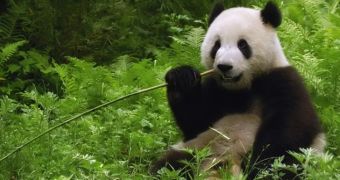It would appear that, some time ago, horses in China embraced a career in bullying, and spent several years in a row stealing wild pandas' lunch. In doing so, they became a threat to the long-term survival of this already endangered species.
The issue is detailed in a paper authored by Michigan State University researchers and published in the Journal for Nature Conservation.
In this paper, doctoral student Vanessa Hull explains that she first figured out that something was off in China as far as protecting the wild population of pandas was concerned while keeping tabs on several such bears with the help of GPS collars.
As detailed on the official website for the Michigan State University, the pandas that Vanessa Hull's research focused on were the ones living in the Wolong Nature Reserve.
The doctoral student says that, after spending several years monitoring these animals, she came to realize that they were more of less willingly sharing their bamboo with local livestock.
Thus, Vanessa Hull details that, almost a soon as she stumbled upon quite a lot of destroyed patches of bamboo forest, she figured out that not just pandas but also horses had been visiting these buffets.
“It didn’t take particular panda expertise to know that something was amiss when we’d come upon horse-affected bamboo patches,” the doctoral student says.
“They were in the middle of nowhere and it looked like someone had been in there with a lawn mower,” she goes on to explain.
Later investigations revealed that several people living in the region were in the business of raising horses and then selling them in order to make some extra cash.
The problem was that, looking to keep these horses from competing with cattle for grazing areas, these people had turned to setting them loose in local forests and only going after them when customers approached them.
Vanessa Hull and her colleagues then used GPS collars to track horse herds in the Wolong Nature Reserve and found that these horses liked bamboo about as much as pandas do.
Consequently, they ate quite a lot of it, and thus threatened the local wild panda population's food supply, the researchers explain.
The good news is that, shortly after Vanessa Hull and her fellow researchers contacted authorities in the region, locals were banned from releasing horses in the Wolong Nature Reserve Again.
Still, the researchers maintain that, as proven by the findings of this investigation, livestock constitutes a threat to wildlife and should be regarded as such by people looking to implement conservation projects.
“Livestock affect most of the world's biodiversity hotspots. They make up 20 percent of all of the earth's land mammals and therefore monopolize key resources needed to maintain the earth's fragile ecosystems,” says specialist Jianguo Liu with the Michigan State University.

 14 DAY TRIAL //
14 DAY TRIAL //